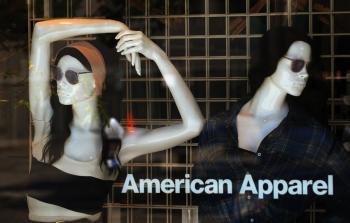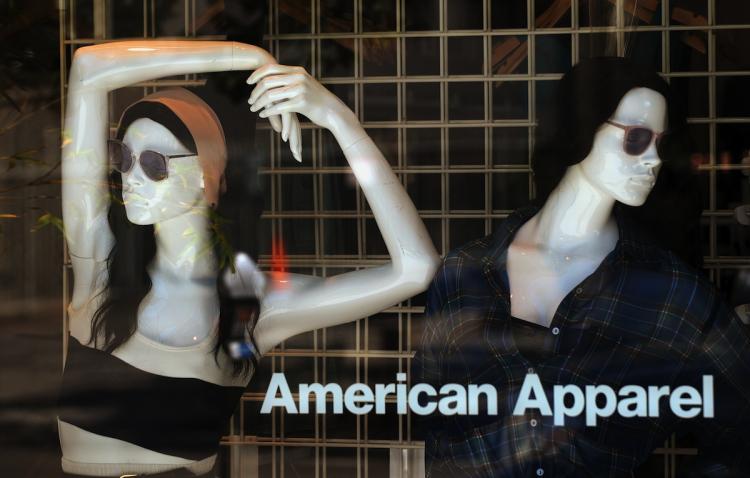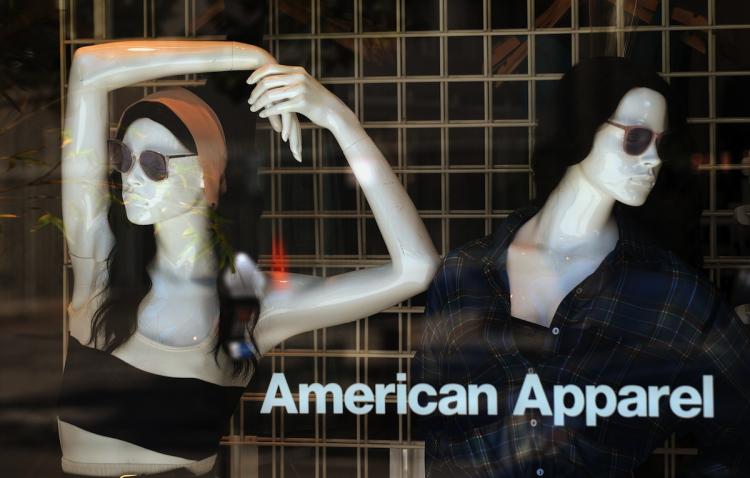NEW YORK—One glance at the American Apparel store on 183 E. Houston St. and you’ll notice that it’s unlike any other clothing company.
Outside its storefront, a young, attractive employee leaned against the large, glass window, with a cigarette in hand, staring eastward into the distance toward the Williamsburg Bridge. She donned slim black jeans, suspenders, and a tucked-in, crisp white linen shirt that evoked more “hipster” than “off-putting salesperson” vibe.
Inside its window display, mannequins in suggestive poses modeled bright pastel-colored tights, cardigans, and light jackets. The store, busy as always.
In other words, American Apparel fits the Lower East Side like a glove.
Founded by Canadian-born, U.S.-educated entrepreneur Dov Charney, the company became America’s largest vertically integrated clothing manufacturer. Starting out as a wholesaler of t-shirts, the company went from brandless to a mega-popular retail giant with 285 stores in 20 countries.
To the masses, it is better known for its “Made in Downtown L.A.” tagline, its anti-sweatshop ethos, youth-targeted and alternative marketing, and its sexually explicit and flamboyant advertising.
But today, American Apparel is being threatened by the same forces that seek to engulf any major corporation. It is facing lawsuits from employees and inquiries from the Securities & Exchange Commission (SEC) for late quarterly filings and an abrupt resignation of its external auditors—a perfect storm that pushed it close to bankruptcy this summer, according to the LA Times.
Harassment Charges
The company is the subject of a slew of lawsuits on grounds of alleged sexual harassment.
In 2005, three separate lawsuits were filed against Charney, the company’s chief executive officer, alleging that they were subject to sexual harassment. The lawsuits are still pending.
While unrelated to the lawsuits, the company’s corporate culture is anything but conventional. At American Apparel’s headquarter in Los Angeles, Charney has decorated the interior walls of the company with covers of Penthouse Magazine and photos of female employees in risqué poses—all taken by Charney himself.
In a NY Times report, Charney has allegedly conducted interviews with female prospective workers while only wearing underwear. And according to the blog Gawker, internal company memos indicate that applicants to some company positions must submit head-to-toe photos of themselves.
Continued on the next page...
American Apparel has vigorously defended itself against the sexual harassment claims, and as for its internal company culture, it says that since it is a private company, it is free to exercise its sexual freedom within its corporate walls.
Auditors Resign
This summer, its external accountants, Deloitte & Touch LLP, suddenly quit, sending the company’s shares drastically lower after the news broke.
In a letter to the company’s board in July, Deloitte said that the company’s 2009 financials may not be relied upon, and that American Apparel is suffering from a lack of internal controls and adequate accounting personnel.
In a securities filing with the SEC, American Apparel said the auditors identified “material weaknesses in internal control over financial reporting,” which could impact the reliability of its financial statements.
The U.S. attorney’s office in the Southern District of N.Y. has requested documents from the company over Deloitte’s resignation. Marcum LLP is the new auditor of the account.
Due to the recent switch of external accountants, it is unclear whether the company can file its quarterly financials for the period ended June 30 by Nov. 15, or face delisting of its shares from the American Stock Exchange.
Shares of American Apparel (AMEX: APP) have declined 62 percent since the beginning of the year. Last Friday, it closed at $1.17.
Labor Issues
Guillermo Ruiz, a former employee of the company, filed a class-action wages and hour lawsuit against American Apparel for allegedly failing to pay certain wages for hours worked.
The suit also “alleges that the company failed to comply with certain itemized employee wage statement provisions and unfair competition law,” according to the company’s latest quarterly financial filings with the SEC.
At heart of the issue is American Apparel’s image of being pro-worker and anti-sweatshop—they’re central to the company’s marketing strategy.
In the same filing, the company disclosed that should the lawsuit be decided against the company, it “could not only incur substantial liability but also experience an increase in similar suits and suffer reputational harm.”
Outside its storefront, a young, attractive employee leaned against the large, glass window, with a cigarette in hand, staring eastward into the distance toward the Williamsburg Bridge. She donned slim black jeans, suspenders, and a tucked-in, crisp white linen shirt that evoked more “hipster” than “off-putting salesperson” vibe.
Inside its window display, mannequins in suggestive poses modeled bright pastel-colored tights, cardigans, and light jackets. The store, busy as always.
In other words, American Apparel fits the Lower East Side like a glove.
Founded by Canadian-born, U.S.-educated entrepreneur Dov Charney, the company became America’s largest vertically integrated clothing manufacturer. Starting out as a wholesaler of t-shirts, the company went from brandless to a mega-popular retail giant with 285 stores in 20 countries.
To the masses, it is better known for its “Made in Downtown L.A.” tagline, its anti-sweatshop ethos, youth-targeted and alternative marketing, and its sexually explicit and flamboyant advertising.
But today, American Apparel is being threatened by the same forces that seek to engulf any major corporation. It is facing lawsuits from employees and inquiries from the Securities & Exchange Commission (SEC) for late quarterly filings and an abrupt resignation of its external auditors—a perfect storm that pushed it close to bankruptcy this summer, according to the LA Times.
Harassment Charges
The company is the subject of a slew of lawsuits on grounds of alleged sexual harassment.
In 2005, three separate lawsuits were filed against Charney, the company’s chief executive officer, alleging that they were subject to sexual harassment. The lawsuits are still pending.
While unrelated to the lawsuits, the company’s corporate culture is anything but conventional. At American Apparel’s headquarter in Los Angeles, Charney has decorated the interior walls of the company with covers of Penthouse Magazine and photos of female employees in risqué poses—all taken by Charney himself.
In a NY Times report, Charney has allegedly conducted interviews with female prospective workers while only wearing underwear. And according to the blog Gawker, internal company memos indicate that applicants to some company positions must submit head-to-toe photos of themselves.
Continued on the next page...
American Apparel has vigorously defended itself against the sexual harassment claims, and as for its internal company culture, it says that since it is a private company, it is free to exercise its sexual freedom within its corporate walls.
Auditors Resign
This summer, its external accountants, Deloitte & Touch LLP, suddenly quit, sending the company’s shares drastically lower after the news broke.
In a letter to the company’s board in July, Deloitte said that the company’s 2009 financials may not be relied upon, and that American Apparel is suffering from a lack of internal controls and adequate accounting personnel.
In a securities filing with the SEC, American Apparel said the auditors identified “material weaknesses in internal control over financial reporting,” which could impact the reliability of its financial statements.
The U.S. attorney’s office in the Southern District of N.Y. has requested documents from the company over Deloitte’s resignation. Marcum LLP is the new auditor of the account.
Due to the recent switch of external accountants, it is unclear whether the company can file its quarterly financials for the period ended June 30 by Nov. 15, or face delisting of its shares from the American Stock Exchange.
Shares of American Apparel (AMEX: APP) have declined 62 percent since the beginning of the year. Last Friday, it closed at $1.17.
Labor Issues
Guillermo Ruiz, a former employee of the company, filed a class-action wages and hour lawsuit against American Apparel for allegedly failing to pay certain wages for hours worked.
The suit also “alleges that the company failed to comply with certain itemized employee wage statement provisions and unfair competition law,” according to the company’s latest quarterly financial filings with the SEC.
At heart of the issue is American Apparel’s image of being pro-worker and anti-sweatshop—they’re central to the company’s marketing strategy.
In the same filing, the company disclosed that should the lawsuit be decided against the company, it “could not only incur substantial liability but also experience an increase in similar suits and suffer reputational harm.”






